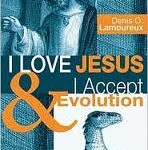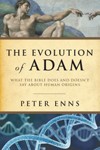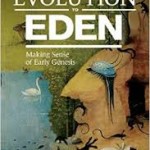 Recently, Daniel Kirk posted his thoughts on the historical Adam question in Fuller Theological Seminary’s Spring 2013 issue of “Theology, News, and Notes.” He followed up with a post on his own blog. Many know Kirk from his books Jesus Have I Loved, but Paul?: A Narrative Approach to the Problem of Pauline Christianity
Recently, Daniel Kirk posted his thoughts on the historical Adam question in Fuller Theological Seminary’s Spring 2013 issue of “Theology, News, and Notes.” He followed up with a post on his own blog. Many know Kirk from his books Jesus Have I Loved, but Paul?: A Narrative Approach to the Problem of Pauline Christianity and Unlocking Romans: Resurrection and the Justification of God
. Kirk is associate professor of New Testament at Fuller.
I saw this article several months ago in an earlier version, and, amid all the controversy and misinformation generated by others, I was excited to see Kirk weighing on this this issue. I hope the article gets the attention it deserves.
Kirk summarizes his entire article well at the end of his introduction:
I want to open up the conversation to the possibility that the gospel does not, in fact, depend on a historical Adam or historical Fall in large part because what Paul says about Adam stems from his prior conviction about the saving work of Christ. The theological points Paul wishes to make concern the saving work of the resurrected Christ and the means by which he makes them is the shared cultural and religious framework of his first-century Jewish context.
Note the two key issues Kirk mentions here:
1. What Paul says about Adam is set up by his prior conviction that in Christ the “new creation” has broken in to present time. Paul draws Adam into a conversation begun by the resurrection of Christ, not vice-versa, and in doing so recasts Adam’s significance beyond that which he has in Genesis.
2. To the extent that Paul sees Adam as the first man, Paul is not making a binding scientific or historical declaration but reflecting his view on such things as a first-century Jew.
In my opinion, both of these observations are absolutely key in coming to a biblically literate and historically knowledgable understanding of the role Adam plays in Paul’s theology.
Later Kirk makes the following observation concering Adam’s function in Paul’s argument in Romans:
What difference might it make to our discussions about a historical Adam that Paul was claiming, “Christ, is (un)like Adam, therefore God’s people are not demarcated by Torah”? This latter statement is, in fact, the point of Paul’s argument in Romans 5 (cf. 5:12–14, 20–21). Paul’s Adam theology is an avenue toward affirming that God has one worldwide people; therefore, the specially blessed people are not defined by the story of circumcision.
What if Paul’s Adam is not a lesson for us about where people came from, but part of Paul’s rhetoric to establish the oneness of God’s people–Jew and Gentile together–that so dominates his letter to the Romans?
Here is one more quote that captures Kirk’s point:
[W]hat is a “given” for Paul is the saving event of Jesus’ death and resurrection. The other things he says, especially about sin, the Law, and eschatology, are reinterpretations that grow from the fundamental reality of the Christ event. Recognizing this relieves the pressure that sometimes builds up around a historical Adam….Adam is not the foundation on which the system of Christian faith and life is built, such that removing him means that the whole edifice comes crashing down. Instead, the Adam of the past is one spire in a large edifice whose foundation is Christ. The gospel need not be compromised if we find ourselves having to part ways with Paul’s assumption that there is a historical Adam, because we share Paul’s fundamental conviction that the crucified Messiah is the resurrected Lord over all.
I hope you have a chance to wander over to Fuller’s website and read the article for yourselves. At the very least, counterarguments would need to provide a more compelling account of Paul’s overall theology in Romans rather than simply lifting verses out of that carefully crafted work and using them for reasons Paul never intended–and never would have understood.











